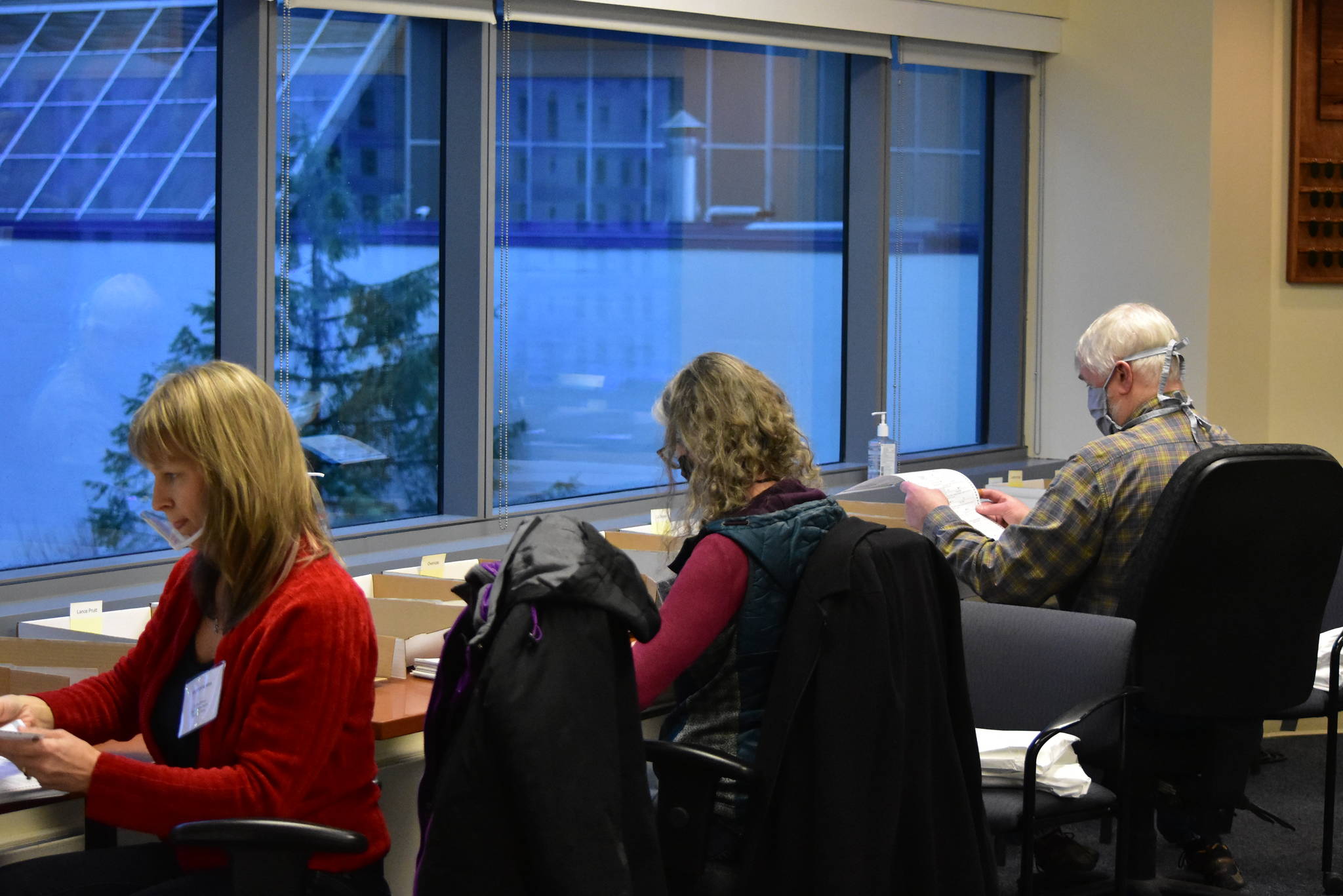Democratic challenger Liz Snyder secured her victory Friday evening over House Minority Leader Lance Pruitt, R-Anchorage, according to the results of a recount in a race won by 11 votes. The Alaska Division of Elections released the results of the recount Friday evening, confirming Snyder’s win.
DOE staff and members of the Alaska State Review Board started the recount process shortly after 9 a.m. Friday, with some members of the board hand-counting ballots and others observing.
Assistant Attorney General Cori Mills was on-site to assist with any legal questions that arose. Ballots were counted by hand and then fed into a paper counting machine. A table was drawn on a whiteboard showing the number of votes each candidate had in each precinct certified by the state.
Snyder slowly overtook Pruitt as Alaska’s protracted election process counted more by-mail and other outstanding ballots. Recounts can only be requested once the State Review Board has certified the results of the election, which it did Monday. DOE announced the recount Wednesday.
Neither candidate responded to request for comment.
Pruitt was House Minority Leader, and the leadership for the upcoming session is far from settled. With Snyder’s victory, Democrats hold 16 seats, Republicans hold 21 and there are three independents. Twenty-one votes are needed to secure a majority. In the 31st Alaska State Legislature, several Republicans caucused with Democrats and independents to form a majority that elected Bryce Edgmon, I-Dillingham, Speaker of the House.
While a simple majority is needed to secure many votes, many budget bills must receive two-thirds of the vote in order to pass under state law. Other votes, such as veto overrides, need three-quarters of the vote in the House. Reaching the necessary vote threshold caused delays in the last legislature as caucuses fought for consensus.
But some of those Republicans lost their primaries to party challengers and it’s unclear if a similar bipartisan majority caucus will emerge. Anchorage Republicans Jennifer Johnston and Chuck Kopp, co-chairs of the House Finance and Rules Committees respectively, and members of the majority caucus both lost their primaries to challengers from their own parties. At least two Republicans who joined the Majority, Bart LeBon of Fairbanks and Louise Stutes of Kodiak, are returning to Juneau.
Edgmon and Ketchikan’s Dan Ortiz, both independents are returning to the Capitol as well. Ortiz was also a member of the Majority Caucus. Kotzebue independent Josiah “Aullaqsruaq” Patkotak, a first-timer, told Alaska Public Media last month he hasn’t decided on a caucus but has said he’ll oppose cuts to certain programs benefiting rural Alaska.
Spokesmen for both House Majority and Minority declined to comment on the potential makeup of caucuses in the upcoming session.
[Lt. Gov. seeks initiative audit to calm questions]
“Republican members are confident they’ll be able to carry out the authorities given to them by the voters,” said Zach Freeman, spokesman for the House Minority in an email.
In 2019, House Members took a record 31 days to elect a house speaker, and longer still to fill all the committee positions necessary for the business of the Legislature to move forward.
The Alaska Senate will see a similar shake-up in leadership as Senate President Cathy Giessel, R-Anchorage, lost her primary to a Republican challenger in August. Fairbanks Republican John Coghill, who had served in the Legislature since 1999, also lost his seat to a party challenger. The new Senate will have 13 Republicans and seven Democrats, most of whom are incumbents. Robert Meyers, R-Fairbanks, and Roger Holland, R-Anchorage, are newcomers.
Senate Majority spokesman Daniel McDonald declined to comment on potential leadership in the new session.
The governor must submit his budget for the next fiscal year beginning July 1, 2021, by Dec. 15, according to state law. In its spring forecast, the Alaska Department of Revenue said the state can expect a significant reduction in state funds largely due to the coronavirus pandemic.
On Monday DOE staff will begin the audit of Ballot Measure 2, a package of election reforms. Lt. Gov. Kevin Meyer ordered an audit of the vote, which similarly saw results slowly change as additional ballots were counted. Meyer told the Associated Press in November he called for the audit not because he felt the vote was compromised in any way, but to calm public concerns about the integrity of the state’s Dominion voting machines.
That audit will take place at DOE’s regional election office in the Mendenhall Mall and will begin at 9 a.m., Montemayor said.
Contact reporter Peter Segall at psegall@juneauempire.com. Follow him on Twitter at @SegallJnuEmpire.

